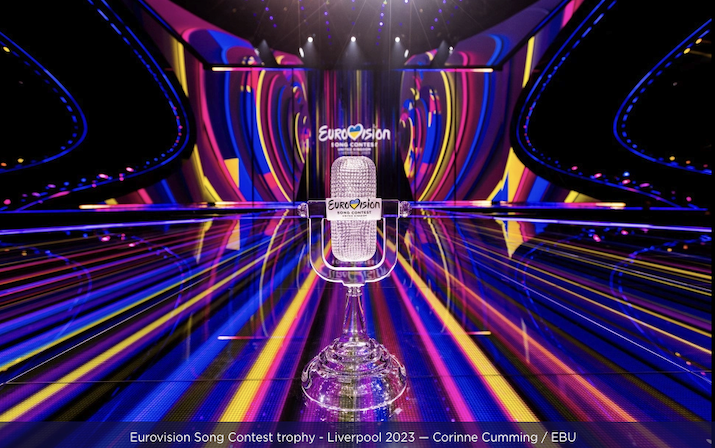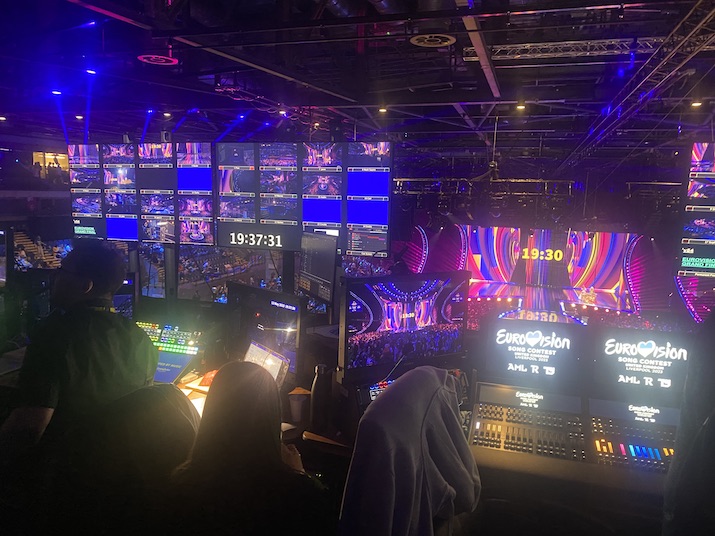Eurovision Song Contest Rivals Largest Sports Productions in Scale and Reach
Competition with artists from 37 countries drew more than 160 million on-air, online viewers
Story Highlights
Is there a broadcast competition that could dwarf the recent NFL Draft or even the Olympics? There is, and it took place on Sunday in Liverpool, UK.
With “teams” from 37 countries competing, the 2023 edition of the Eurovision Song Contest may appear to be a European version of The Voice or American Idol, but the joint production by host broadcaster BBC and EBU Eurovision Network (comprising more than 100 public broadcasters across Europe) managed 50 live feeds of two semifinals on May 9 and 11 and 26 feeds for the finale on May 13, totaling eight hours of live performance.
Attracting an estimated audience of more than 160 million on-air and online via TikTok and YouTube, the production arguably had much in common with a World Cup series, with entries competing for national honors as much as for artistic achievement. Its fan voting procedures are as convoluted as those for an NFL Draft.
 “It is the biggest live music event in the world by audience, and no other show attempts live voting on this scale,” Eurovision Services Project Leader Lennard Bartlett told SVGEurope. “There’s no other show like it.”
“It is the biggest live music event in the world by audience, and no other show attempts live voting on this scale,” Eurovision Services Project Leader Lennard Bartlett told SVGEurope. “There’s no other show like it.”
The Big Show
The event took place at Liverpool’s M&S Bank Arena. Normally, the previous year’s winner would host, but 2022 victor Ukraine was unavailable because of the war with Russia (whose Eurovision entries have been barred since the 2022 invasion). In fact, air-raid sirens sounded across Ukraine as this year’s contest was under way).
Staging was on a colossal scale: a reported 8 miles of cabling for lighting, sound, video, and SFX; more than 2,000 specialist lighting fixtures; 200 custom staging decks; and 10,225 sq. ft. of staging for the main stage. The lighting alone required 165,000 channels and 23,700 individual light sources held aloft by most of the 600 rigging points, including 2,500 automated color-changing robotic lights and 15 follow spots, controlled via nine lighting consoles running 28,000 lighting cues.
The Sound of Music
The event’s audio required deployment of 150 mostly wireless microphones and more than 1,200 individual streams of audio. Live venue sound was through L-Acoustics L-Series PA speakers and mixed over DiGiCo consoles, both provided by production integrator Britannia Row.
Comms were understandably both critical and complex. Riedel Communications, with a crew of 22 onsite, deployed more than 100 RSP series intercom panels, 170 Bolero full-duplex wireless beltpacks and associated accessories, and 10 C3 full-duplex wired beltpacks — much of it on 10 miles of fiber backbone. Signal distribution and management was based on MediorNet, handling about 200 audio and 400 video signals and associated services. Additionally, there were 32 simplex and semi-duplex radio channels for 250 handheld radios plus associated accessories for broadcast/show-related communications, such as show call, TV crew, and stage management.

The co-production of BBC and EBU Eurovision Network managed as many as 50 live feeds in 8 hours of live performance.
Just as with any major broadcast-sports event, the picture and sound weren’t left to speak for themselves: 29 commentators provided live annotation from the arena, with Riedel providing 45 CCP commentary panels, 90 monitors, and a centralized routing facility housing commentary and coordination lines for 30 master-control rooms in 24 countries across Europe and the world.
The event’s logistics rivaled the Super Bowl halftime spectacular’s usual chaotic changeover from game to show. The Eurovision Song Contest managed to switch all 37 of its musical moments with less than 50 seconds to strike and set between performances.
Replays, of course, are available: all 37 songs are available via various streaming services and on the event’s official YouTube channel. The competition streamed in the U.S. on NBC/Comcast’s Peacock.
SVT won the 67th Eurovision Song Contest with “Tattoo,” performed by Swedish chanteuse Loreen — only the second artist (and only female) to win the Eurovision Song Contest twice, having done so in 2012). Sweden now has seven victories in the Eurovision Song Contest, equaling Ireland’s record set in 1996.
Fans track the Eurovision artists as avidly as they follow their sports teams. As one superfan put it to the BBC, “It’s like sport without the sport.” The event is an avatar of the convergence of sports and entertainment that is leading the growth in all types of media, including broadcast and streaming.
For instance, on June 10, Nigerian Grammy Award–winning and multi-platinum–selling singer, songwriter, and producer Burna Boy will co-headline the 2023 UEFA Champions League Final Kick Off Show by Pepsi at Istanbul’s Atatürk Olympic Stadium. Last year’s show was topped by Camila Cabello at the Stade de France. And of course, the Olympics Opening and Closing Ceremonies have come to resemble events like the Grammy Awards.
PepsiCo VP, Global Brand Marketing, Eric Melis, who oversees the brand relationship between UEFA and Pepsi (the Super Bowl’s halftime sponsor for a decade until Apple took over this year), told UK-based Sport Industry Group in March, “It’s no secret that the lines between sport and popular culture are rapidly blurring. At an ever increasing rate, we’re seeing the often segmented worlds of music, fashion, art, and sport collide.”
